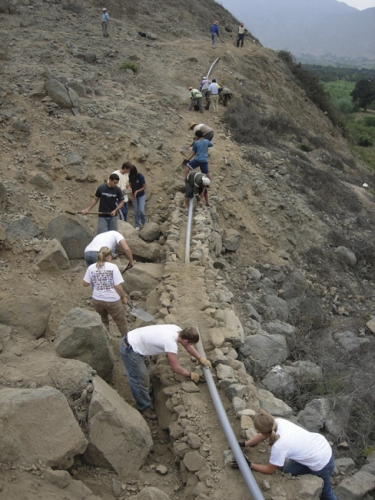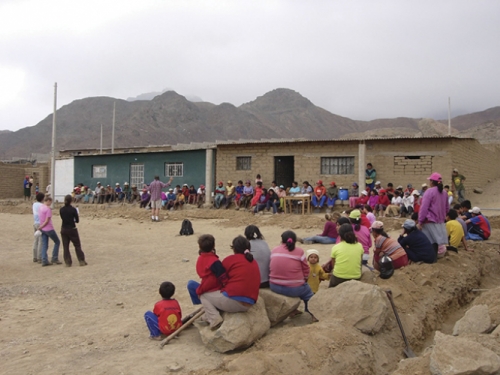In June 2008 archaeologist Brian Billman led about two dozen UNC and Duke students to a small village in the Moche Valley of northern Peru. Their goal: to build a new water system for the community by the end of the summer.
It wasn’t the first tough job Billman had taken on in Ciudad de Dios. His relationship with the village extends back to 1998, when he had just started a dig at a site nearby. A series of narrow desert ridges above the village hold the remains of a complex once occupied by the pre-Incan Moche people. On that first trip, Billman’s team uncovered common as well as elite dwellings, and — unexpectedly — a few pieces of gold.
“As we were wrapping up for the summer, we realized the site would be unprotected until we came back,” Billman says. “What most projects will do is hire a guard, but that doesn’t always work very well.”
So he and Peruvian collaborator Jesus Briceño came up with an unusual idea: they’d hire not just one guard, but the whole village of Ciudad de Dios. The villagers would prevent anyone from looting the site or building on top of the ruins, and in exchange, Billman’s team would contribute twelve hundred dollars each year toward amenities for the community. The arrangement worked well, and over the past decade the stipend has paid for a schoolhouse, a road leading into the village, and other projects.
When the villagers decided they wanted a better water system than the unreliable government-run pipeline, the UNC and Duke chapters of Engineers Without Borders came up with a blueprint. “It’s basically a big concrete box that taps water from a spring in the desert above the village,” says Julie Tajuba, a UNC environmental engineering student. “We made sure to pick a source at the highest elevation, so the system could be all gravity-fed.”
Tajuba and other Engineers Without Borders students came to Ciudad de Dios at the beginning of the summer to complete the system design, help build the spring box, and dig trenches throughout the village. Then students from the UNC antipoverty group Nourish International and a Duke service-learning program worked alongside villagers to dig more trenches and lay two miles of pipe.
Alyson Zandt and other Nourish students blogged about their work as it progressed. “The original plan was to dig a trench through the loose soil of the farmland in the valley, and reimburse the farmers whose land we disrupted,” Zandt writes. “Unfortunately, most of the farmers objected to our digging through their land.” Instead, the team and the villagers had to run the pipe along the side of a mountain, cutting trenches twenty inches deep into the rocky ground using only pickaxes and shovels.
The project also turned out to be more expensive than expected. In the final weeks of the summer, the team ran out of money for PVC pipe to finish the line, and students came to the rescue by raising five thousand dollars mostly from family and friends in the States.
Despite the last-minute snags, at the end of eleven weeks the team had laid the final pipes and water began to flow through the system. By September the pipeline was bringing more than enough water to meet the needs of the village’s three hundred residents.
The relationship between Billman’s team and Ciudad de Dios will continue, and Billman hopes to foster similar partnerships between archaeological teams and villages at other sites throughout the valley. This is one of the goals of MOCHE, a nonprofit organization he cofounded with students and alums of his archaeological field school and that raised the money for the water system.
Esther Namkoong, a junior who plans to work in global health and environmental science, saw the project as a taste of what she might do after graduation. “You might think that after such a challenging project as this one, you would want to start running in the direction of some high-end job that earns a six-figure salary,” Namkoong writes. “But I feel quite the opposite — I’m excited and ready to work with more projects like this. There’s something new to prepare for every day, and the people you meet and experiences you have are unforgettable.”
Brian Billman is an associate professor of anthropology in the College of Arts and Sciences. Julie Tajuba is a master’s student in environmental engineering in the School of Public Health. Alyson Zandt and Esther Namkoong are a senior and junior majoring in international studies.




